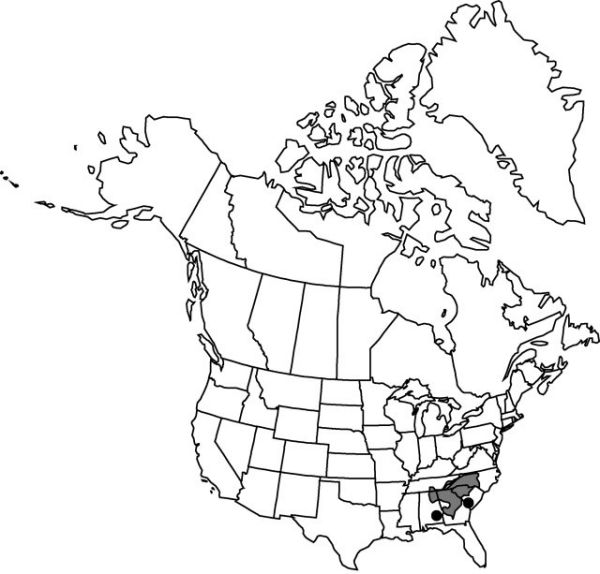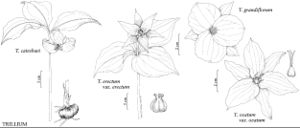Trillium catesbaei
Sketch Bot. S. Carolina 1: 429. 1817.
Rhizomes short, tapered to a point distally. Scapes 1–2, round in cross-section, 2–4.5 dm, slender, glabrous. Bracts usually raised somewhat, exposing flower; blade green, often with underlying purplish maroon in well-lighted plants, major veins on adaxial surface deeply engraved, elliptic-ovate, 6.5–15 × 4–8 cm, including elongated, petiolelike base, proximal 1/3 of leaf gradually tapered to base, margins often slightly raised, apex blunt-acute to acuminate. Flower opening at or recurved below bracts, rarely erect; sepals falcate-recurved, green or streaked with purple, linearlanceolate, 20–45 × 7–8 mm, margins ± flat, apex acuminate; petals falcate-recurved distally, white, pink, or rose, darkening to pink or nonfading with age, veins visible but not appearing engraved, elliptic-oblong to oblong-lanceolate, 3.5–5 × 1–2+ cm, thin-textured, bases somewhat imbricated, forming funnel-like tube, margins undulate, apex acuminate; stamens prominent, recurved, 16–25 mm; filaments white, slightly longer and narrower than anthers; anthers recurving, bright-yellow, 5–14 mm, thick, dehiscence introrse; ovary inconspicuous, white, angular-ovoid, deeply 6-angled, 4–12 × 3–7 mm, slender, base narrow; style 2–6 mm; stigmas prominent, strongly curled (circinate) to erect, connate basally, pale green or white, not lobed, 4–10 mm, uniformly thin; pedicel deflexed or recurved, rarely erect, angled, 2–4 (–5) cm. Fruits baccate, greenish or whitish, ovoid-globose, angles less prominent when mature, 1–1.5 cm diam., pulpy but not juicy.
Phenology: Flowering spring–summer (late Mar–early Jun).
Habitat: Acid soils, open dry or rich woods, laurel and rhododendron thickets, cove forests
Elevation: 50–800 m
Distribution

Ala., Ga., N.C., S.C., Tenn.
Discussion
Elliott, author of Trillium catesbaei, apparently recognized one of its forms separately as T. nervosum. This name is still mentioned in British horticultural and botanical literature, but it is rarely found in U.S. literature. North American botanists treat T. nervosum as a synonym of T. catesbaei.
Plants of Trillium catesbaei from deep coves in South Carolina tend to have petals that are deeper pink and longer and wider than those of many other populations.
Selected References
None.
Lower Taxa
"thick" is not a number."broad" is not a number."compressed-shortened" is not a number. "elongated" is not a number."thick" is not a number."dm" is not declared as a valid unit of measurement for this property."thicker" is not a number."thin" is not a number.
